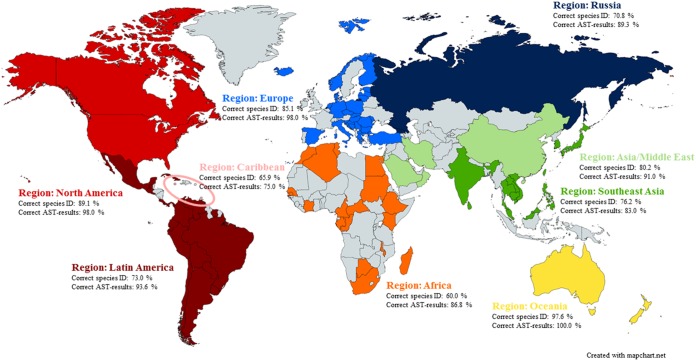FIG 1.
Map indicating the participating countries colored with respect to the region to which they belong (Africa, Asia/Middle East, Caribbean, Europe, Latin America, North America, Oceania, Russia, or Southeast Asia). Performance with regard to the species identification and antimicrobial susceptibility testing is indicated as average % of correct results. The 96 participating countries included the following, by region: in Africa, Algeria, Botswana, Cameroon, Central African Republic, Republic of the Congo, Egypt, Ethiopia, Gambia, Gabon, Ivory Coast, Kenya, Madagascar, Malawi, Mauritius, Morocco, Senegal, South Africa, Sudan, and Tunisia; in Asia and the Middle East, China, Islamic Republic of Iran, Israel, Kuwait, Oman, and Saudi Arabia; in the Caribbean, Barbados, Grenada, Jamaica, and Trinidad and Tobago; in Europe, Bosnia and Herzegovina, Bulgaria, Croatia, Cyprus, Czech Republic, Denmark, Estonia, Finland, Germany, Greece, Hungary, Iceland, Italy, Latvia, Lithuania, Luxembourg, Macedonia, Malta, Republic of Moldova, The Netherlands, Norway, Poland, Romania, Serbia, Slovakia, Slovenia, Spain, and Turkey; in Latin America, Argentina, Bolivia, Brazil, Chile, Colombia, Costa Rica, Cuba, Ecuador, El Salvador, Guatemala, Mexico, Panama, Paraguay, Peru, Suriname, Uruguay, and Venezuela; in North America, Canada, and the United States; in Oceania, Australia, New Caledonia, and New Zealand; in the Russian region, Belarus, Georgia, Russian Federation, and Ukraine; and in Southeast Asia, Brunei Darussalam, Cambodia, India, Japan, Republic of Korea, Lao People's Democratic Republic, Malaysia, the Philippines, Singapore, Sri Lanka, Taiwan, Thailand, and Vietnam.

